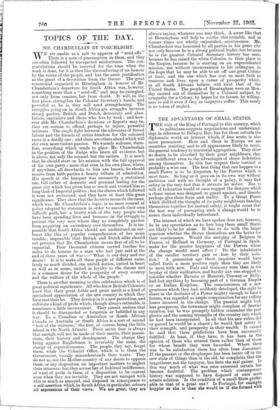TOPICS OF THE DAY.
MR. CHAMBERLAIN BY TORCHLIGHT.
WE are unable as a rule to approve of " send-offs.' There is a note of presumption in them, and they are often followed by unexpected misfortunes. The con- gratulations should be reserved for the time when the work is done, for it is then like the conferring of an honour by the voices of the people, and has the same justification as the grant of a decoration from the throne. The great ceremonial organised at Birmingham in honour of Mr. Chamberlain's departure for South Africa was, however, something more than a " send-off," and may be exempted, not only from censure, but from doubt. It will, in the first place, strengthen the Colonial Secretary's hands, and powerful as he is, they will need strengthening. The struggles going on in South Africa are struggles between strone. parties, British and Dutch, democrats and abso- lutists, capitalists and those who live by work ; and how- ever able Mr. Chamberlain's decisions or Reports may be, they are certain to offend, perhaps to injure, powerful interests. The single fight between the advocates of forced labour and the friends of entire freedom for the coloured races is a deadly one ; and there are others ahead which will stir even more violent passion. We warmly welcome, there- fore, everything which tends to place Mr. Chamberlain in the position of the Judge who hears all evidence, but is above, not only the counsel, but the suitors. It is much that he should start on his mission with the full approval of his own party ; more that even in his own place, where, if anywhere, all drawbacks to him are known, he should receive from both parties a hearty tribute of admiration. His speech at the banquet was necessarily a restrained one, full rather of domestic and personal feeling for the great city which has given him so much and trusted him so long than of Imperial politics ; but the cheers which followed it were not restrained, and they have at least this great significance. They show that the desireto reconcile the races, which was Mr. Chamberlain's topic, is no mere counsel of policy adopted by statesmen in order to smooth their own difficult path, but a hearty wish of the very people who have been spending lives and treasure in the struggle to prevent the very race whom they so completely pardon from acquiring an ascendency over themselves. It is im- possible that South Africa should not understand an out- burst like this of popular comprehension of her main trouble ; impossible that British and Dutch alike should not perceive that Mr. Chamberlain means first of all to be impartial. Four thousand citizens carried torches for miles to do honour to a man who had just said at the end of three years of war :—" What is our duty and our desire ? It is to make all these people of different races, lately so much divided, one united nation, united in heart as well as in name, united in loyalty to the throne and in a common desire for the prosperity of every country and the welfare of the whole of the people."
There is another meaning to this celebration which is of great political significance. All who know British Colonists know that their great foible and great merit is a kind of specialised appreciation of the new country in which they have cast their lot. They develop in it a new patriotism, and cultivate a kind of pride which, though always estimable, is sometimes a little inconvenient. They cannot endure that it should be disregarded or forgotten or belittled in any way. To a Canadian or Australian or South African Canada or Australia or South Africa is a sort of second " hub of the universe," the first, of course, being the little island in the North Atlantic. Their secret fear is always that enough will not be made of their merits, their posses- sions, their history and development. The charge they bring against Englishmen is invariably the same, the charge of superciliousness. The people, they say, forget them, while the Colonial Office, which is to them the Government, usually misunderstands their wants. They do not ac,,use the Mother-country of any desire to oppress them, or any disposition on important matters to neglect their interests; but they accuse her of habitual indifference, of want of pride in them, of a disposition to be content even when they are invisible. They are not enraged with this so much as annoyed, and disposed in consequence to a self-assertion which, in South Africa in particular, colours all expressions of their views. We are great, they are happier as she is than she would be if she formed with always saying, whatever you may think. A scene like that at Birmingham will help to soothe this irritable, and in former times not wholly unjustified, sensitiveness. Mr. Chamberlain was honoured by all parties in his great city not only because he is a strong political leader, but because he is the greatest Colonial Secretary history has seen, because he has raised the white Colonies to their place in the Empire, because he is starting on an unprecedented mission, not without inconvenience to his colleagues, in the hope that he may be able to set off one great Colony at least, and the one which has cost us most both in treasure and lives, upon a career of prosperity which, as all South Africans believe, will rival that of the United States. The people of Birmingham were on Mon- day carried out of themselves by a Colonial subject, by sympathy for a Colony, by hopes for its future, by willing. ness to aid it even if they as taxpayers suffer. This surely is no token of neglect.










































 Previous page
Previous page